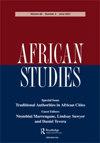Learning and performing political violence: ZANU-PF Youth and the 2008 presidential run-off election in Zimbabwe
IF 1
4区 社会学
Q2 AREA STUDIES
引用次数: 3
Abstract
ABSTRACT This article examines political violence enacted by youth during the presidential run-off election in Zimbabwe in 2008. After the presidential election in March 2008, no clear winner emerged, leading to a run-off election in June 2008 between Robert Mugabe of Zimbabwe African National Union-Patriotic Front (ZANU-PF) and Morgan Tsvangirai of the Movement for Democratic Change (MDC). In the face of a possible defeat in the run-off, ZANU-PF unleashed significant levels of violence against MDC activists and members, such that Tsvangirai withdrew. Central to the violence were youths, and mainly young men, who performed this violence for diverse reasons, including promises of material rewards and compliance due to fear of being labelled as a sell-out. While not denying the significance of these reasons, this article explores the importance of political socialisation of youth in Zimbabwe by the ‘war generation’, that is, those who fought during the war of liberation in the 1970s. This socialisation entailed the propagation of an authoritarian nationalist narrative by ZANU-PF in which violence was justified in defending ‘the revolution’. This narrative was very pervasive in the years preceding 2008 and in the months leading up to the run-off. There is evidence that suggests that youths learnt about the efficacy of violence through this process of political socialisation and, on this basis, performed violence during the run-off. We conclude that this ‘indoctrination’ is of some significance in understanding youth violence in 2008. However, we argue that any youths considered as inspired on nationalist grounds to enact violence also had their own personal motivations that are irreducible to nationalist fervour.学习和实施政治暴力:津巴布韦非洲民族联盟-爱国阵线青年党和2008年津巴布韦总统决选
本文考察了2008年津巴布韦总统决选期间青年所实施的政治暴力。2008年3月的总统选举后,没有明显的赢家出现,导致2008年6月的决选在津巴布韦非洲民族联盟爱国阵线(ZANU-PF)的罗伯特·穆加贝和民主变革运动(MDC)的摩根·茨万吉拉伊之间。面对可能在决选中失败的局面,非洲民族联盟-爱国阵线对争取民主变革运动的活动人士和成员发动了大规模暴力,茨万吉拉伊因此退出了选举。暴力的核心是年轻人,主要是年轻人,他们出于各种原因实施暴力,包括承诺物质奖励和由于害怕被贴上卖国的标签而服从。虽然不否认这些原因的重要性,但本文探讨了“战争一代”对津巴布韦青年政治社会化的重要性,即那些在20世纪70年代参加解放战争的人。这种社会化导致了非洲民族联盟-爱国阵线(ZANU-PF)威权主义民族主义叙事的传播,在这种叙事中,暴力是捍卫“革命”的正当理由。这种说法在2008年之前的几年里以及决选前的几个月里非常普遍。有证据表明,年轻人通过政治社会化的过程了解了暴力的有效性,并在此基础上,在决选期间实施暴力。我们的结论是,这种“灌输”对理解2008年的青少年暴力有一定的意义。然而,我们认为,任何被认为受到民族主义启发而实施暴力的年轻人也有他们自己的个人动机,这些动机不能归结为民族主义狂热。
本文章由计算机程序翻译,如有差异,请以英文原文为准。
求助全文
约1分钟内获得全文
求助全文

 求助内容:
求助内容: 应助结果提醒方式:
应助结果提醒方式:


